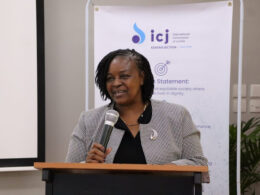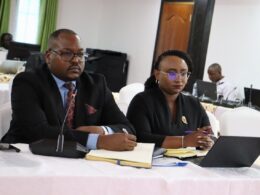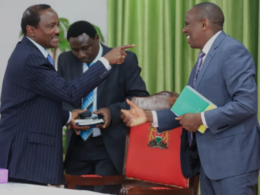NAIROBI,Kenya – In October Kenya was elected to the 47-member United Nations Human Rights Council. An intergovernmental body tasked with the responsibility of promoting and protecting all human rights around the world. Ironically amid much criticism, the elevation of Kenya to the council appeared to be a mockery to victims of human rights abuses in the wake of Kenya’s appalling and ever-increasing cases of enforced disappearances, abductions and killings, particularly in recent months.
While the council has the ability to discuss all thematic human rights issues and situations that require its attention, little can be said about Kenya, as the government has given close to no attention to issues back home, except when pressed by civil society organizations and Kenyans to address these horrific violations.
At the helm of government, president William Ruto has been accused of failing to deter such vices despite pledging to end the menace repeatedly. Still within the executive branch of government, earlier this year, the Prime Cabinet Secretary Musalia Mudavadi was also on the spot for claiming that police brutality and use of excessive force do not occur in Kenya during the 44th ordinary session of the African Union’s Executive Council of Foreign Affairs Ministers in Addis Ababa, Ethiopia.
Also, the newly appointed Deputy President and immediate former Interior Cabinet Secretary Prof. Kithure Kindiki’s comments before the National Assembly’s committee on Administration and Internal Security on Kenyans killed during protests and the apparent defense of police’s use of excessive force were considered crass, especially towards victims’ families who are yet to receive answers let alone justice for their deaths.
In recent weeks alone, Kenyans have become almost desensitized by the increasing cases of macabre killings, and abductions that have become a source of national discourse casting a shadow on the government’s commitment to safeguarding human rights and upholding the rule of law.
Videos online depicting hooded individuals, believed to be a covert police unit abducting people, in public or even from their homes have been seen as means to an end – discouraging public dissent, in turn instilling fear in Kenyans. Surprisingly though, these actions have only reignited Kenyan’s collective mission to confront and eradicate abductions and even enforced disappearances.
A report by the missing voices coalition this year showed that 118 people were killed by police in 2023 while 10 were forcefully disappeared. Discouragingly few police officers accused of committing these heinous acts have been arrested or even charged in court. In 2024, data of those killed and abducted is so far worryingly higher
In order to address the problem, the government cannot in its right conscious blatantly lie to its citizens. It’s time for government to self-reflect and take meaningful action in order to rebuild public trust in administrative institutions and the criminal justice system.
Kenya now needs to ratify the international convention for the protection of all persons from enforced disappearances which came into effect in 2010. Under it, the state would be responsible for investigating such violations and bringing to justice perpetrators of these heinous acts.
Shukri Wachu is a journalist and a communications officer at the Kenyan Section of the International Commission of Jurists (ICJ-Kenya). This article was first published on the Standard Newspaper.











